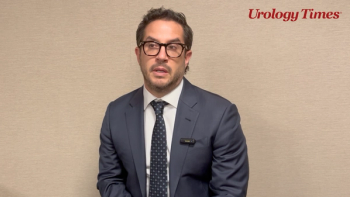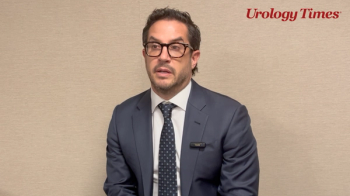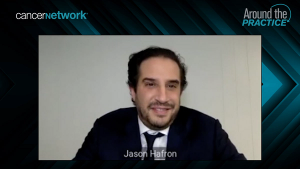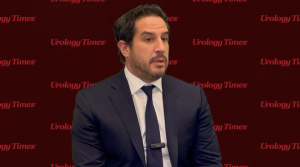
One particularly striking finding from KEYNOTE-905/EV-303 is the nearly 60% pathologic complete response rate.

One particularly striking finding from KEYNOTE-905/EV-303 is the nearly 60% pathologic complete response rate.

Jason M. Hafron, MD, CMO, touches on the growing shift toward biomarker-driven therapy in advanced prostate cancer.

Jason M. Hafron, MD, recaps noteworthy prostate cancer research from ESMO 2025.

Panelists discuss how the future of IsoPSA and similar biomarkers depends on data validation, payer support, and integration into clinical guidelines.

Panelists discuss how IsoPSA strengthens biopsy discussions by providing objective data that supports patient confidence in shared decision-making.

Panelists discuss how IsoPSA shows promise for equitable diagnostic performance but requires ongoing evaluation to ensure benefits reach all populations.

Panelists discuss how provider education and system-level support are vital for overcoming adoption barriers and ensuring IsoPSA is effectively used in practice.

Panelists discuss how pairing IsoPSA with MRI strengthens risk assessment and supports more informed shared decision-making in prostate cancer care.

Panelists discuss how IsoPSA strengthens diagnostic certainty by addressing gaps in MRI performance, offering a more reliable basis for biopsy decisions.

Panelists discuss how IsoPSA’s long-term predictive performance supports safer follow-up strategies and greater confidence in risk-based management.

Panelists discuss how real-world evidence confirms IsoPSA’s predictive value, showing that high scores align with significantly greater long-term cancer risk.

Panelists discuss how IsoPSA improves diagnostic accuracy by targeting PSA protein structure, offering clearer insights for patient selection than concentration-based testing.

Panelists discuss how structure-based biomarkers such as IsoPSA improve risk stratification by distinguishing aggressive disease from indolent cases more effectively than PSA level alone.

Jason M. Hafron, MD, CMO, reflects on the most impactful recent developments in prostate cancer and offers insight into where the field is headed.


"I think AI is going to have a significant role. We're just at the tip of the iceberg," says Jason M. Hafron, MD, CMO.

“[There’s] a lot going on in bladder cancer in the non–muscle invasive, muscle-invasive space, as well as in some of the biomarkers, which is exciting and will definitely have a huge impact on the management of your patients," says Jason M. Hafron, MD, CMO.

“As we move through 2025, I think we're going to see more and more expansion of new ideas, new isotopes, and possibly improvement in PET imaging for the future,” says Jason M. Hafron, MD, CMO.

“Time will tell as we move forward, but it has allowed us to use MDT, with or without ADT and ARPIs, to potentially look at hormone-free treatments,” says Jason M. Hafron, MD, CMO.

“And you look at most of the trials that were done in this space, about 2/3 of time, over 60% of time, management was changed based on a PET scan,” says Jason Hafron, MD.

"It's a little tedious to find these patients, but it's really critical. Otherwise, you're not going to get reimbursed for these therapies," says Jason Hafron, MD.

"Bladder cancer is exploding. [It] is exciting, it's changing, and we're just at the start of this," says Jason M. Hafron, MD, CMO.

The panel concludes by offering key takeaways on the evolving treatment landscape for BCG-unresponsive non–muscle invasive bladder cancer.

Experts on non–muscle invasive bladder cancer discuss promising developments in the overall treatment landscape, highlighting potentially practice-changing clinical research.

Bladder cancer specialists discuss their strategies for monitoring patients with BCG-unresponsive non–muscle invasive bladder cancer.

A panel of experts provide clinical insights on factors that inform how they select treatments for patients with BCG-unresponsive non–muscle invasive bladder cancer.

Experts on bladder cancer discusses strategies to minimize adverse effects and the role of immunotherapy in BCG-unresponsive NMIBC treatment paradigms.

Bladder cancer experts discuss quality of life and progression considerations and their impact on treatment decisions for patients with BCG-unresponsive NMIBC.

Jason Hafron, MD, CMO, provides an overview of the QUILT trial investigating N-803 in patients with BCG-unresponsive high-grade non–muscle invasive bladder cancer.

The panel reviews data from the SunRISe-1 trial investigating TAR-200 and offers its impressions on the efficacy and safety findings.

Published: March 3rd 2025 | Updated:

Published: December 9th 2021 | Updated:

Published: December 2nd 2021 | Updated:

Published: December 9th 2021 | Updated:

Published: March 5th 2021 | Updated:

Published: April 26th 2025 | Updated: